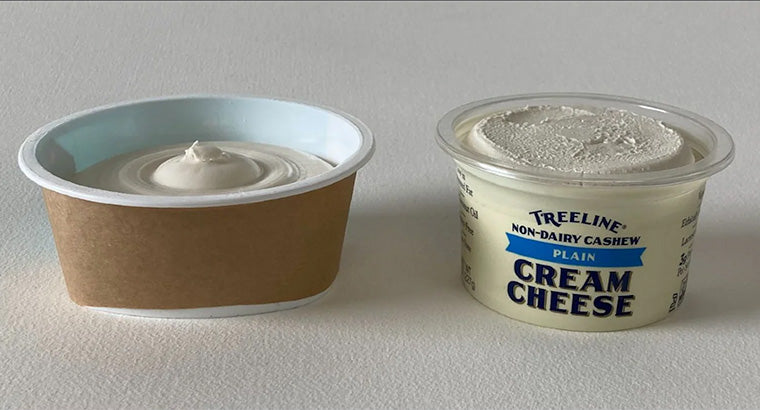Not All Vegan Cheese Likes America's Arteries
Hello Friends of Treeline and of not having a heart attack,
Over the past two years, there’s been a proliferation of new plant-based cheeses. It seems like the idea of dairy-free cheese has become so popular that even dairy companies are trying to get in on it.
But what exactly are they offering consumers who want to switch to plant-based cheese?
Three words - poor heart health.
I will start with Philadelphia. That name will be familiar to you - it’s the cream cheese you grew up eating. It now comes in a plant-based version. If you thought the dairy version wasn’t great for your health, the plant-based version is not going to make you feel any better. Each serving of the plant-based stuff has 6g of fat,100% of which is saturated fat. That’s exactly the same amount as in the dairy version.
Your cardiologist will tell you to keep your saturated fat intake under 20g a day if you want to avoid having a heart attack. So have a toasted bagel with a dollop of Philadelphia plant-based cream cheese on it, and your arteries are done for at least the next 24 hours. Do it every day and have a peanut butter sandwich every now and then, and you’re asking for trouble.
Well, you might say, protein is a lot more important than fat. Don’t look to plant-based Philadelphia for that. It has zero protein. You read that right. Plant-based Philadelphia has 0g of protein per serving.
Treeline’s cashew cream cheese has one sixth of the saturated fat of both plant-based and dairy Philadelphia (just 1g of saturated fat), and 2g of protein per serving - the same as dairy Philadelphia.
I put that in bold to address those vegan-skeptics who have the annoying habit of asking vegans where we get our protein. I will repeat. We get it from cheese. Vegan cheese. Rather - we get it from Treeline vegan cheese because you certainly won’t find it in Philadelphia’s plant-based version.
Put another way - you can eat almost an entire tub of Treeline before you get to the amount of saturated fat in one tablespoon of Philadelphia. And you’d have to eat an entire pallet load of plant-based Philadelphia, to get as much protein as you’d find in half a tablespoon of Treeline.
Well, the vegan-skeptics will say, dairy has a lot of calcium. Where is that calcium in Philadelphia? The fact is, there isn’t any. And I am talking about both the dairy and plant-based versions. You read that right too, but it bears repeating. According to the nutrition facts on the packaging, neither plant-based Philadelphia nor dairy Philadelphia makes any significant contribution to your daily need for calcium.
Treeline on the other hand, has 20mg of calcium per serving. See above for the reason why that’s in bold. I am not saying you should eat Treeline instead of broccoli. I am saying that if you think you’re going to get some calcium from dairy Philadelphia you might have osteoporosis in your future.
Now for Bel’s new plant-based Mini Babybel. This plant-based take on an old French favorite for kids, from a venerable French cheese company, is nothing but a mini hockey puck of fat and starch. Kids need a lot of protein and calcium to grow big and strong. Mini Babybel has a muscle-atrophying zero grams of protein and a bone-crunching zero grams of calcium. And the fat, which makes up just about the entire cheese, is just about all saturated.
Here’s another example from our friends at Bel - vegan Boursin - the plant-based version of another French favorite. It too has no protein (compare that to Treeline’s French Style that has 3g) and a whopping 5g of saturated fat per 1 oz serving. There’s as much saturated fat just one tablespoon of plant based Boursin as in an entire tub of Treeline.
I want to make it clear that I really applaud these companies for moving towards plant-based cheese. Too many cows are suffering and too much methane is going into the atmosphere because of their products. But do they really have to make their plant-based products so unhealthy? Are they secretly trying to get people to stick to their dairy versions for the sake of their health?
Let’s look at another top selling brand - Violife. This one is not owned by a dairy company. Violife sells vegan products exclusively. I’ll hold back on talking about what their cream cheese tastes like. After all, some people do enjoy chowing down on face cream. Let’s just look at the saturated fat. One tablespoon of this cheesy concoction contains 6g of saturated fat, 0g of protein and no calcium. You know the Treeline stats by now.
Despite my joy that maybe fewer cows are suffering because of plant-based Philadelphia, Boursin and Violife, I believe they are doing more harm to the vegan movement than good. I believe vegan food should be good for you. I don’t believe non-vegans will switch to vegan products that are as bad (or worse) for human health as animal based products.
It is a sad fact that plant-based hasn’t delivered on retailers’ (particularly conventional retailers’) expectations. Well, let me tell you why it hasn’t delivered. It’s because the plant based products they are selling don’t taste good and are really really unhealthy. Can you blame consumers for not being excited about them?
If any retailers out there are reading this, please consider that plant-based consumers are often plant-based for health reasons. America’s arteries will thank you for it.
Your cardiologist’s friend and founder of Treeline,
Michael Schwarz



